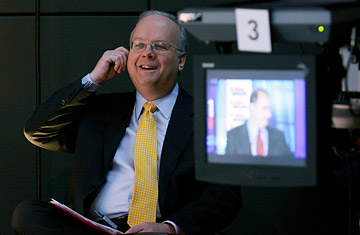
Former chief political advisor to President Geroge W. Bush, Karl Rove.
A year after leaving the White House under the pall of an electoral setback and a congressional investigation, Karl Rove — hero of the right, scourge of the left — is back. With a twist.
In private, Rove speaks regularly with the McCain campaign, where his former protégé Steve Schmidt is now the manager. He's also dialed in at the Republican National Committee, run by Mike Duncan, another former aide. And he still lunches two or three times a month with President Bush.
But Rove has also been busy refashioning his public persona. A regular commentator for Fox News and an occasional columnist for the Wall Street Journal and Newsweek, Rove is the undisputed chairman of the Republican commentariat, delivering what his friend and former Clinton administration lawyer Lanny Davis calls "balanced, intelligent and sometimes even-handed" analysis from his lofty media perches.
All told, as the sprint to November gets under way, Rove's influence is as great or greater than any other private player in America.
It's a remunerative collection of media jobs. Rove and his new employers won't say how much he's making — "not until you ship me your income tax return and send me your monthly bank statements," Rove says when asked. But a knowledgeable industry source says he gets $50,000 a pop for the two to three speaking engagements he does every week. By several accounts his book deal with Simon and Schuster brought in a seven-figure advance. The Wall Street Journal declined to discuss his employment, and John Moody, his boss at Fox News, says only, "Karl brings a lot of special skills and we recognized that."
But money and airtime are just part of Rove's carefully calibrated public second act. It's also about reputation. After a 15-year run as George W. Bush's resident campaign genius, Rove left the White House diminished by accusations he played a role in politicized hiring at the Justice Department. (An internal report on the matter is expected soon.) He was wounded, too, by the revelation that — despite numerous, vigorous denials by the Administration — he indeed leaked the identity of CIA officer Valerie Plame. And the 2006 election, whose outcome he got wildly wrong, was seen as a repudiation of both the President and his most trusted adviser.
Given all that, it's no wonder Rove's post-White House remake has taken on the character of one last campaign — this one for himself.
Parts of Rove 2.0 look familiar to those who have followed him over the years. After fielding e-mails from reporters, pundits and operatives through multiple election cycles — and apparently saving their contact information — Rove has built up the best e-mail list of opinion makers in the business. Those players suddenly find themselves on the receiving end of mass mailings from Rove every time he pens a new op-ed piece, enhancing his reputation as the king of direct mail.
More surprising to those who didn't know him in person is his successful recasting as a wonk. Smart, candid and capable of an objectivity that seems downright fair-minded, Rove has won over even some who were more comfortable viewing him as a dark strategic overlord. Reviewers at the New York Times and Slate have called him "mild-mannered," "dispassionate," "generous" and even "graceful." "He makes his case well and comes across as thoughtful and fair," says Bush's chief of staff, Josh Bolten. "I'm surprised that people are surprised at that."
Rove's access to his old employers and peers makes his job easier, but it also carries risks. His peanut butter and honey sandwiches with Bush give Rove White House access, but reinforce the public perception of a shared fate — something the new Rove needs to shake. The rise of Schmidt and the ensuing Roveian attacks on Obama have also increased the ease with which Obama can link McCain to the tactics of his predecessor. That's fine if McCain wins, but "it'll be interesting to see what happens to Rove's reputation and how much people are willing to listen to his crap if Obama wins," says a frustrated Democratic Senate aide.
Rove still lives in the comfortable Palisades neighborhood of Washington, D.C. and keeps his offices in the capital as well. He says he plans to move back to Texas, and is, "already sticking [a] toe back in the water there." But if his campaign of reinvention succeeds, it's hard to imagine this most political of animals in any other habitat.
